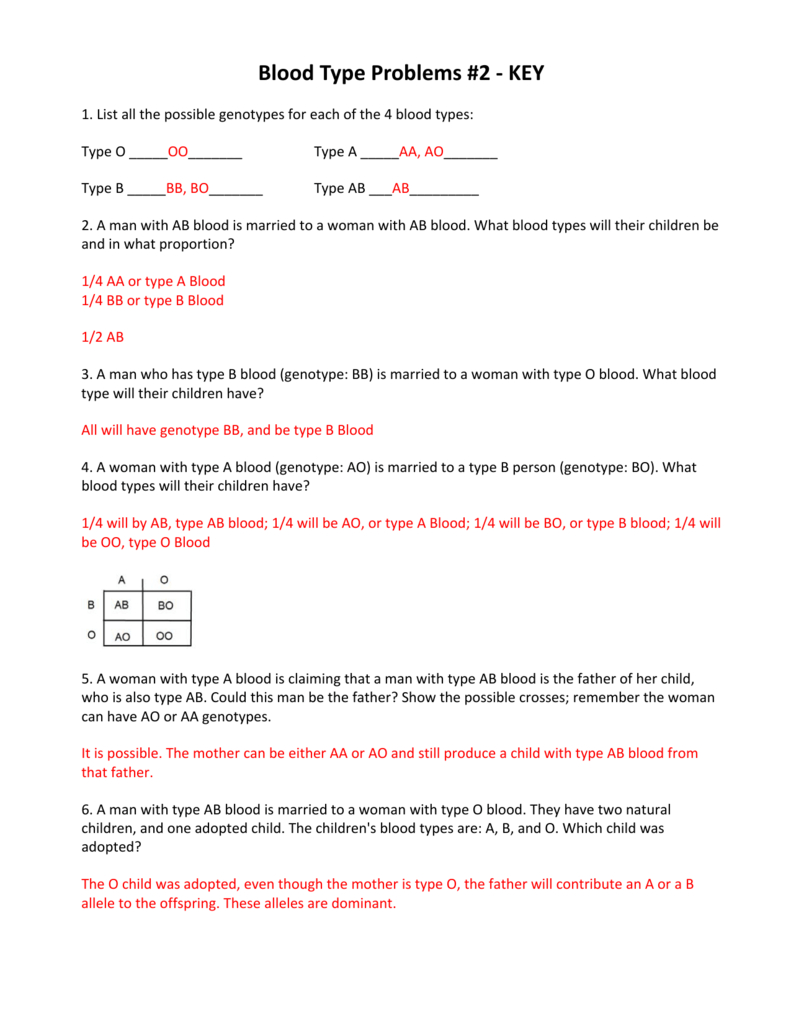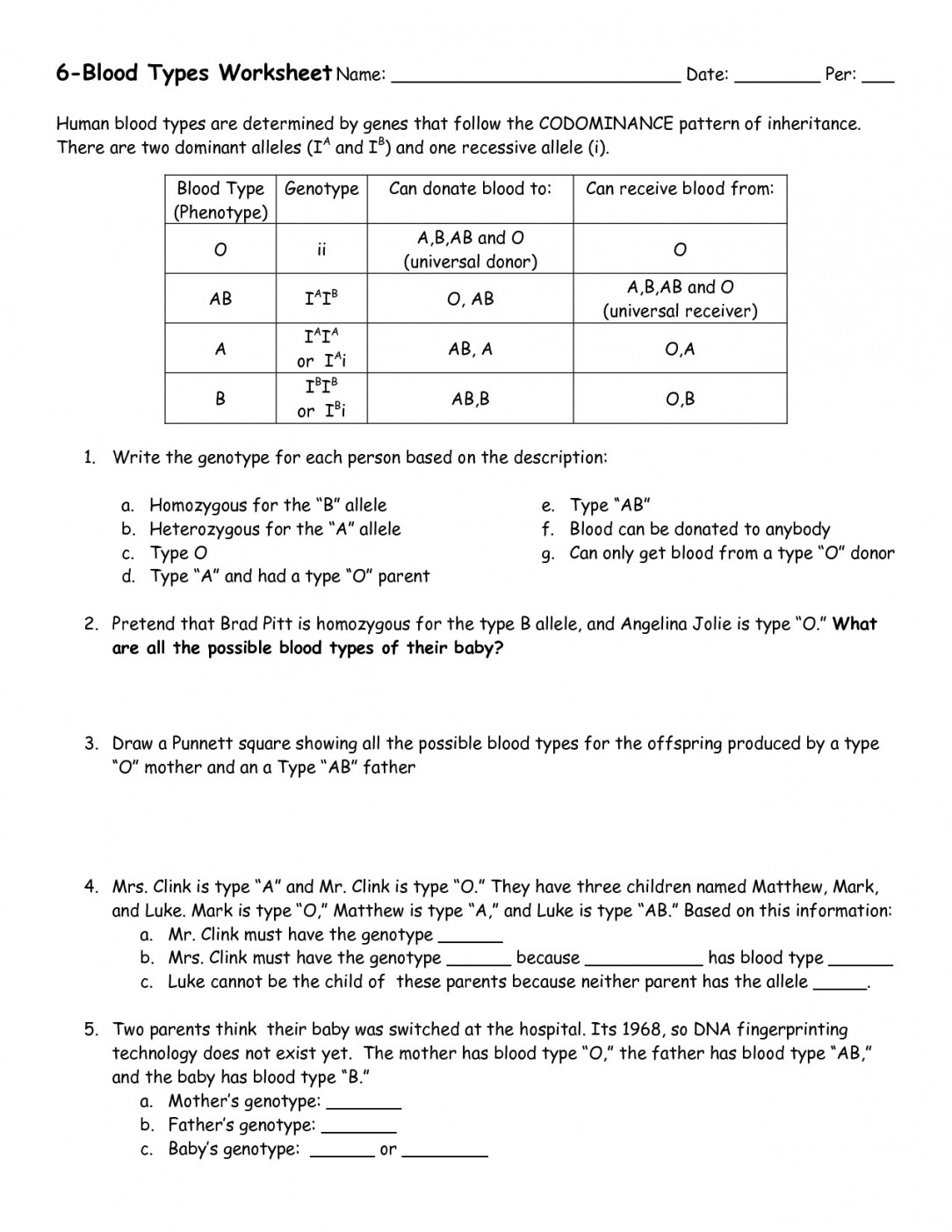Have you ever wondered why your blood type matters? It’s a question that’s intrigued me since I was a kid, especially after learning about the “universal donor” and “universal recipient” blood types. Growing up, I thought it was fascinating to know that some individuals could donate blood to anyone, while others could only receive blood from a limited pool of donors. This simple fact sparked my curiosity about the complex world of blood types, leading me down a path of discovery that continues to this day.

Image: db-excel.com
Fast forward to today, where the concept of blood types has transcended the realm of mere biological classification. With growing scientific understanding and societal awareness, blood types have become intertwined with aspects of health, nutrition, and even personality traits. While the notion of blood-type diets and blood-type personality analysis remains controversial, these concepts highlight the widespread interest in unraveling the mysteries of our blood.
Understanding the ABCs of Blood Types
Your blood type is determined by the presence or absence of specific proteins called antigens, located on the surface of red blood cells. These antigens act as markers, allowing your immune system to distinguish your own blood cells from foreign cells. The most common blood type system is the ABO system, which categorizes individuals into four main blood types: A, B, AB, and O.
Each blood type is characterized by a unique combination of antigens:
- A blood type: Possesses A antigens.
- B blood type: Possesses B antigens.
- AB blood type: Possesses both A and B antigens.
- O blood type: Doesn’t possess either A or B antigens.
In addition to the ABO system, another crucial factor in blood typing is the presence or absence of the Rh factor. The Rh factor is a protein found on the surface of red blood cells. Individuals with the Rh factor are Rh-positive (Rh+ ), while those without it are Rh-negative (Rh-).
Blood Type Compatibility and Transfusions
Understanding blood type compatibility is vital for safe blood transfusions. This compatibility depends on the presence or absence of antibodies in the blood, proteins that target and destroy foreign antigens.
For instance, someone with type A blood has anti-B antibodies in their plasma, meaning their immune system would attack B antigens if they received a transfusion of type B blood. Similarly, someone with type B blood has anti-A antibodies. Individuals with type AB blood have neither anti-A nor anti-B antibodies, which makes them “universal recipients” capable of receiving blood from all other types. Type O blood lacks both A and B antigens, making it the “universal donor” compatible with all blood types.
The Significance of Blood Type Compatibility
The importance of blood type compatibility in transfusions cannot be overstated. Incompatible transfusions can result in a serious, even life-threatening, condition known as a transfusion reaction. In severe cases, this reaction can lead to organ damage, blood clotting, and even death.
Beyond transfusions, blood type compatibility also holds significance during pregnancy. If a pregnant woman is Rh-negative and her fetus is Rh-positive, there’s a risk of Rh incompatibility. This occurs when maternal antibodies attack the fetal red blood cells, potentially leading to complications such as hemolytic disease of the newborn. Thankfully, routine care, including Rh immunoglobulin injections, can help prevent such complications.

Image: classdbfrank.z19.web.core.windows.net
Beyond the Basics: Blood Typing and Beyond
While blood type compatibility is a cornerstone of medical practices, research continues to explore the broader implications of blood types. For example, some studies suggest potential associations between blood type and specific medical conditions. This includes investigations into possible links between blood type and an increased risk of certain types of cancers, cardiovascular diseases, or infectious diseases.
However, it’s crucial to emphasize that these connections are still under investigation, and further research is needed to establish definitive correlations. It is also important to note that these potential associations do not imply causation. It’s always advisable to consult with a medical professional for personalized guidance on your health.
Navigating the Landscape of Blood Type Claims
The intriguing nature of blood type has led to a plethora of claims, some grounded in science, others more speculative. One area that has generated considerable discussion is the realm of blood type diets, promoting the idea that specific foods are better suited for individuals based on their blood type.
While some studies suggest potential benefits, the scientific evidence for blood type diets is limited and inconclusive. The majority of scientific experts recommend adhering to a balanced, healthy diet rather than relying solely on a blood-type-specific dietary approach.
Another area of fascination is the concept of blood type personality analysis, suggesting a correspondence between blood type and personality traits. This theory has gained traction in some cultures, particularly in Japan, where blood type analysis is integrated into aspects of daily life, including matchmaking and workplace dynamics.
However, no credible scientific evidence supports a direct link between blood type and personality. The idea that blood type determines personality characteristics is considered pseudoscience lacking a scientific basis.
Tips for Understanding Your Blood Type
While blood type analysis might not always offer definitive answers about diet or personality, knowing your blood type is valuable for several reasons:
- Safe blood transfusions: Knowing your blood type allows for safe, compatible transfusions if needed.
- Pregnancy management: Understanding your blood type, especially if you are Rh-negative, is crucial for managing potential complications during pregnancy.
- Personalized health decisions: While research on blood type-related conditions is ongoing, knowing your blood type can inform personalized healthcare choices.
Expert Advice on Blood Type
It’s important to rely on credible sources for information about your blood type and its significance. Consulting with a medical professional, such as a doctor or hematologist, is always the best approach to understanding your individual blood type and its implications for your health.
Additionally, reputable medical organizations like the American Red Cross provide valuable information on blood donation, transfusion safety, and blood type compatibility.
Frequently Asked Questions
Q: How do I find out my blood type?
A: You can find out your blood type through a simple blood test performed by a healthcare provider or a blood donation center.
Q: Can I change my blood type?
A: No, your blood type is genetically determined and cannot be altered.
Q: Is it true that certain blood types are more susceptible to certain diseases?
A: Some studies suggest potential associations between blood type and specific diseases, but more research is needed to establish definitive correlations.
Q: What should I do if I have a blood type-related concern?
A: If you have any concerns about your blood type or its implications for your health, consult a medical professional for personalized advice.
Blood Type Review Worksheet Answer Key
Conclusion
Understanding your blood type is essential for safe blood transfusions, pregnancy management, and potentially informed health decisions. While some claims surrounding blood type diets and personality analysis lack scientific support, recognizing your blood type is valuable for various aspects of your healthcare journey. Remember, always consult with a healthcare provider for accurate and personalized information about your blood type and its significance.
Are you interested in learning more about your blood type and its implications for your health? Feel free to share your thoughts and questions in the comments below! I’m here to provide information and resources to help you better understand this vital aspect of your biology.






